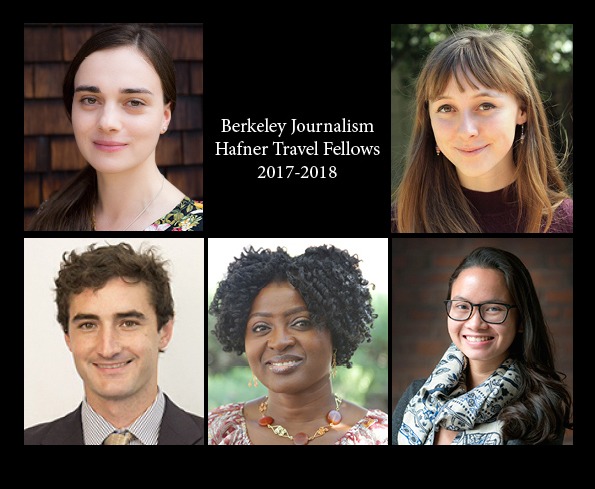
Five second-year students are the recipients of special funding for international travel to cover reporting in Africa, Asia and Central America.
The students–Rosa Furneaux, Chloe Lessard, Stefanie Le, Marc Vartabedian and Grace Oyenubi–are the beneficiaries of funding from 1955 journalism graduate Dick Hafner in memory of his wife Mary. The gift, Dick Hafner wrote at the time he created the fund, “reflects her more than 60 years of interest in the practice of news reporting and information conveyance.”
“It’s wonderful to receive a gift like this in memory of someone to whom journalism was so important,” said Edward Wasserman, dean of Berkeley Journalism. “To honor Mary Hafner’s life by providing students the ability to undertake international travel for their thesis projects really is invaluable. Her legacy will live on through these stories and the careers of these reporters. I couldn’t think of a more loving tribute to someone.”
Rosa Furneaux will be traveling to Northern Kenya to report on the sexual exploitation of girls and young women in Turkana County as a result of a seven-year drought. She said that before she came to Berkeley, she knew she wanted to pursue a longform story on women’s issues, human rights or maternal health. She also knew she had to go back to East Africa, where she had previously reported. The project is “where everything intersected,” she said.
For Chloe Lessard, her reporting trip to Fukushima, Japan, will be a culmination of work in the combined Master of Journalism and Master of Public Health program. She will go to Iwaki-shi, to report on the first citizen-run radiation lab in Japan. The lab was established by a group of mothers who feel that seven years after the nuclear disaster, the Japanese government’s response remains inadequate.
Lessard has been interested in this story since she visited Fukushima as part of a travel reporting class at Berkeley.
“It has always been in the back of my mind. I’m so happy that this is the story that I get to tell,” she said.
Marc Vartabedian will travel to Leon, Guanajuato, in Mexico to talk to leather-makers and auto industry experts about the recent boom in car manufacturing. His story will examine the growth of the auto industry while reporting the effects it has had on migration. Early indications are that this boom in manufacturing in the country’s leather capital has attracted many families and workers in the United States to return to Mexico.
Yesica Prado, a fellow second-year student, will join him to take photographs and help with translation. Together, they hope to “humanize this largely ignored story of reverse migration.”
Stefanie Le’s project is based on the work she did over the summer in the investigations department at the International Criminal Court in the Hague, and at the Human Rights Center Investigations Lab at UC Berkeley last year. Le is traveling to Berlin to profile Syrian Archive, an NGO that preserves open-source evidence of human rights violations in Syria.
Open-source evidence includes photos and videos that are posted online and on social media that show war crimes in various regions of the world. Material like this, Le said, is tricky to enter into evidence because it can be fake or hard to validate.
Grace Oyenubi will visit Nigeria to work on her documentary on people who have been displaced by the Islamist insurgency Boko Haram. She’s heading to a camp to talk to three women who have suffered from this displacement.
“I’m from Nigeria. This is a story that’s local to me,” she said. “It’s an important story that no one else will have done.”
By Nuria Marquez Martinez (‘19)
